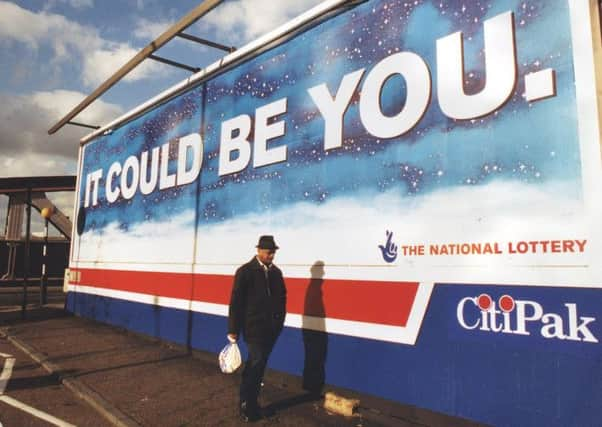Lori Anderson: We’ve all been lottery winners


IT IS the powder pink paper of promise. It comes in the same livery as Agent Provocateur’s beribboned boxes but has the potential to be so much more exciting. For just £2 you too can have a dream that can last for up to seven days, one contained only by imagination and which can carry you off on a magic carpet to a yacht in the Bahamas, a penthouse overlooking Hyde Park, or allow you to live out that dream of becoming a Bond villain on a private island.
For the more saintly it opens up the path of benevolence and a charitable foundation whose good deeds will continue long after the mortal coil has been shuffled off. Diana Vreeland declared we should ‘think pink’, and when it comes to dreams of avarice there is no other hue than pink, the colour of a National Lottery ticket.
Advertisement
Hide AdAdvertisement
Hide AdThere are many who consider the National Lottery, which turned 20 this month, to be a tax on the stupid who are unable to appreciate that the odds of winning the jackpot are akin to dying of an asteroid strike but it’s an argument that I don’t buy, as off-hand I haven’t heard of anyone dying in such a manner but every week I read with envy about the latest lucky winner. Winning the National Lottery is for many the adult equivalent of the Willy Wonka Golden Ticket of their childhood. That little ticket brings to the nation a collective goal with unique dreams.
I do worry about those who hold fast to lucky numbers though, for at first they were chained inexorably to a weekly purchase, and if they forgot to buy a ticket one week and their numbers actually came up, how could they ever forgive themselves?
CONNECT WITH THE SCOTSMAN
• Subscribe to our daily newsletter (requires registration) and get the latest news, sport and business headlines delivered to your inbox every morning
Now that this pressure has been doubled with the mid-week lotto, or tripled if you include the EuroMillions, better to opt instead for the random lucky dip.
When John Major launched the National Lottery in November 1994 there were fears that the nation would go to the dogs, literally, that we would all become inveterate gamblers. Critics of the lottery may have deemed a raffle ticket to be harmless fun but they considered a lottery ticket to be a gateway ‘drug’ which led straight to the bookies and the life of a degenerate gambler.
When Noel Edmonds and Anthea Turner pushed the button and started the first lottery machine spinning there were deep concerns that the buzz of gambling away £1 would prove too infectious. In a certain way it has proved to be infectious, but only up to a point. Today 35 million tickets are bought each week with the average person buying three tickets.
John Major said “the country is going to be a lot richer because of the lottery” and, for some, he was right. Over the past two decades 3,600 people have become millionaires and new millionaires are being created at a rate of six per week. Dumfries now has one lottery millionaire for every 8,288 adults, one of the highest ratios of winners in the country.
The wise ones have remained anonymous, the option picked by 85 per cent of winners but among those who have waived their right we know that some have spent their winnings on curious things such as a fireworks factory, a football team and my favourite, a new pair of hips (everyone reading this sentence who has a fine pair of working hips should feel like a lottery winner, at least for a second or two.) Over the past 20 years, £53 billion has been paid out in winnings, while £32 billion has been spent on good causes including 52,000 different grants to sports, arts, heritage, environment, health and community projects in Scotland. The National Lottery has revamped the National Museum of Scotland, the Robert Burns Museum and the RSS Discovery and would we have two giant silver horses heads rising out of the ground without the National Lottery? No we would not, as The Kelpies and the Helix Project were the recipients of £25 million which was the largest grant every made in Scotland by the Big Lottery Fund.
Advertisement
Hide AdAdvertisement
Hide AdThe National Lottery has indeed changed Scotland but the European Lottery could have done even more. By the end of the referendum campaign Chris and Colin Weir, who won £161 million on EuroMillions, had donated £3.5 million to the SNP and helped to persuade 45 per cent of the population to vote Yes. Imagine if the couple had donated £35 million, it is not inconceivable to think that they could have helped buy a nation’s freedom.
For those who have yet to indulge in a £2 splurge, were they to do so this week they could take advantage of 20 years of data which states that the luckiest numbers are 23, 25, 31, 38, 43 and 44.
The unluckiest number: 13. To my mind the money is never wasted, what each Lotto player does is donate money to charity but instead of receiving only a gaudy sticker on their lapel, the Lotto player will feel their heart beat with benevolent pride and their head swell with dreams that a certain amount of money can indeed buy.
It’s a win/win situation right up until the second when the balls tumble out on a Saturday night and declare us all to be losers.
SCOTSMAN TABLET AND IPHONE APPS